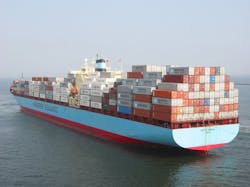Syngenta Reducing GHG Emissions from Ocean Shipping Operations with Maersk ECO Delivery Solution
Syngenta Crop Protection, an agricultural seed innovator, is planning to reduce greenhouse gas (GHG) emissions from its logistics operations with the help of Maersk’s ECO Delivery solution for ocean shipments under an agreement for ocean transport using biofuel for a Europe-US shipping route in 2024.
The ECO Delivery solution will help Syngenta handle its global ocean shipments using certified biofuels, which burn cleaner compared to conventional fossil fuels with less GHG emissions. All of the biofuels to be used are certified by the International Sustainability and Carbon Certification.
“Our partnership with Maersk is based on a common commitment towards sustainable logistics,” said Mike Hollands, Head of Global Supply at Syngenta Crop Protection. “We’ve been energized by our collaboration in ECO Delivery and other carbon emission reduction solutions and are pleased to move closer together towards eventual zero-carbon shipping for a more sustainable future."
Maersk and Syngenta have also partnered to create an Emissions Dashboard, which is a digital innovation for GHG emissions reporting and data analytics.
“If we are to significantly reduce emissions, we need to look for opportunities across our supply chains and beyond,” Hollands noted. “Working with external partners equally committed to sustainability, such as Maersk, enables us to accelerate the de-carbonization of our operations.”
Shipping accounts for around 3% of global greenhouse gas emissions and contributes to assessments of a company’s Scope 3 carbon emissions. These measure the level of GHG emissions from an organization throughout its value chain.
About the Author
EnergyTech Staff
Rod Walton is head of content for EnergyTech.com. He has spent 17 years covering the energy industry as a newspaper and trade journalist.
Walton formerly was energy writer and business editor at the Tulsa World. Later, he spent six years covering the electricity power sector for Pennwell and Clarion Events. He joined Endeavor and EnergyTech in November 2021.
He can be reached at [email protected].
EnergyTech is focused on the mission critical and large-scale energy users and their sustainability and resiliency goals. These include the commercial and industrial sectors, as well as the military, universities, data centers and microgrids.
Many large-scale energy users such as Fortune 500 companies, and mission-critical users such as military bases, universities, healthcare facilities, public safety and data centers, shifting their energy priorities to reach net-zero carbon goals within the coming decades. These include plans for renewable energy power purchase agreements, but also on-site resiliency projects such as microgrids, combined heat and power, rooftop solar, energy storage, digitalization and building efficiency upgrades.
